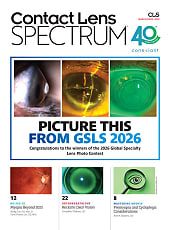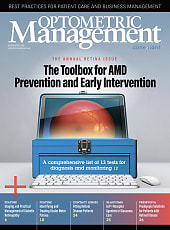In anticipation of commemorating the 60th anniversary of Optometric Management (OM), I traveled to the State University of New York’s School of Optometry’s library, in New York, New York, to plumb their OM archives. (Huge thanks to Ms. Elaine Wells and Ms. Tina Perez for allowing me to access the school’s abundant annals!) Paging through the past, I was particularly taken by the first issue’s “View” section, where the then publishers posed a series of questions:
What Is the Purpose of Optometric Management?
1965: “Optometric Management will entertain you; it will inform you. Most important of all, it will help you. We will show you how you can build and improve your optometric practice…”
2025: Examples include “Inspire. Lead. Succeed: The Power of a Bracelet,” (entertain); “Diabetic Retinopathy and Glucagon-Like Peptide-1 Agonists” (inform), and “Deterring Contact Lens Dropout,” (help).

Who Will Prepare the Material in Optometric Management?
1965: “Most often, it will be written by authorities in the particular field. Still other articles will be written by optometrists, themselves, telling of the practice-building secrets that experience has taught them… Others will be written by the staff of Optometric Management…”
2025: Examples include “Practicing Authentic Appreciation” (authority), “Preventing Buyer’s Remorse,” (optometrists), and “Sunwear: Tips for Patient Buy-In” (staff).
Will We Cover Clinical Subjects in Optometric Management?
1965: “No, not at all. We leave that in the capable hands of the professional journals.”
2025: As scope of practice and optometric education have evolved over the last 60 years, so has the answer to this question. Much of OM’s coverage 60 years later is clinical, though the business/practice management slant remains intact. A recent example: “Dry Eye: Implementing Staff Support.”
Why Will Optometric Management Be Around 60 Years Later?
Admittedly, this question wasn’t posed, but I think it’s worth answering, given that OM has both attracted and sustained a loyal readership over the last 60 years: as is the case with vision and execution and learning and application, clinical knowledge and business knowledge are interdependent for success; especially in a private optometric practice. To be blunt, without practical, how-to tips for implementing advances in diagnostics and treatments for age-related macular degeneration, di- abetic retinopathy, dry eye disease, and glaucoma in practice, patients with these conditions wouldn’t be able to benefit from said advances, and ODs wouldn’t be able to continue to provide them with exceptional care.
Happy 60th Anniversary, OM! Here’s to another 60 years of providing US private-practice ODs with the depth and breadth of knowledge they need to thrive. OM




